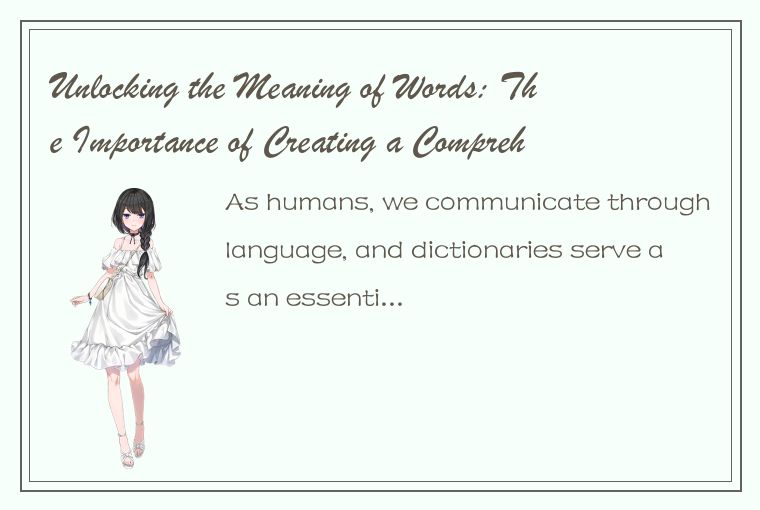As humans, we communicate through language, and dictionaries serve as an essential tool for understanding the meanings of words. However, to fully comprehend a word, it is not enough to simply know its definition. We need to have a comprehensive dictionary entry that provides us with a deeper insight into the word's meaning, usage, and etymology.

A dictionary entry should include several critical elements that help unlock the meaning of a word. These elements include the word's definition, part of speech, example sentences, synonyms, antonyms, and etymology. A comprehensive dictionary entry offers a holistic understanding of the word, allowing us to use it correctly and appropriately in different contexts.
The definition is the starting point of a dictionary entry. It describes the meaning and usage of the word. However, not all definitions are created equal. A good definition should be accurate, concise, and specific. It should convey the essential meaning of the word and differentiate it from other similar words. For example, the word "book" has multiple definitions, including a written or printed work bound together, a record of business transactions, or a bettor's record. A comprehensive dictionary entry needs to clarify what meaning is intended.
Understanding the part of speech is critical for using a word correctly. It tells us whether the word is a noun, verb, adjective, adverb, or another grammatical category. The part of speech determines how we use the word in a sentence and what role it plays. For instance, in the sentence "He runs every morning," "runs" is a verb, while in the sentence, "His runs were successful," "runs" functions as a noun. Knowing the part of speech helps create more accurate and meaningful sentences.
Example sentences are crucial for demonstrating how a word is used in context. Dictionary examples provide a clear understanding of how the word is employed in everyday language. Example sentences allow us to see how to use the word in different contexts and how it can change meaning depending on the usage. For instance, the word "considerate" conveys thoughtfulness towards others. However, using it in different contexts can alter its meaning. "He was considerate of her feelings" implies kindness, while "He considered his options before making a decision" implies careful thought.
Further, Synonyms and antonyms are essential tools for understanding a word's connotation and nuance. Synonyms provide alternative words with similar meanings, while antonyms are words that have opposite meanings. Knowing both synonyms and antonyms helps create a nuanced understanding of the word and how it is used in different contexts. For instance, the word "happy" has many synonyms, including joyful, content, and delighted, and antonyms such as sad, miserable, and unhappy.
A comprehensive dictionary entry should also provide the etymology of the word. The etymology tells us the word's origin, history, and evolution. Understanding where a word comes from and how it has changed over time can help us appreciate its significance and cultural impact. For example, the word "nice" comes from the Latin word "nescius," meaning ignorant, foolish, or stupid. The word underwent a significant shift in meaning during the 16th century to mean "pleasant" or "delightful." Knowing the word's origin and evolution helps us see the depth of its meaning and significance.
In conclusion, creating comprehensive dictionary entries is essential for fully understanding the meanings of words. Dictionary entries should include definitions, parts of speech, example sentences, synonyms, antonyms, and etymology. These elements work together to provide a profound understanding of the word's meaning, nuances, cultural significance, and usage. A comprehensive dictionary entry helps us use words correctly and thoughtfully, allowing us to communicate more effectively.




 QQ客服专员
QQ客服专员 电话客服专员
电话客服专员